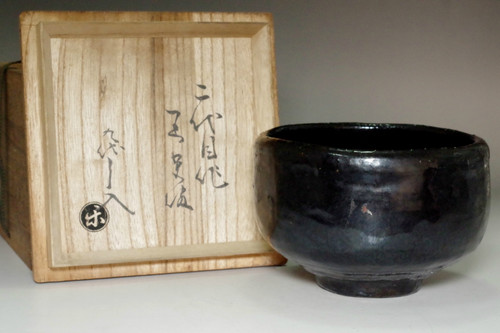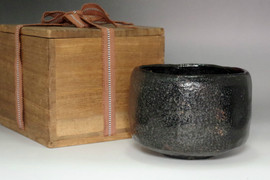Raku 2nd Jokei (1561-1635) Antique kuro-raku teabowl #4330
- SKU:
- 4330
- Shipping:
- Free Shipping
- width: approx. 12cm (4 23⁄32in)
- height: approx. 8cm (3 5⁄32in)
- weight: 325g (w/ box 535g)
- condition: The bowl wobbles a little when it stands. Scratches on the inside.
- writing on the box: made by raku the second, writing by Raku 9th Ryonyu
Sons of Tanaka Sokei, Somi and Shozaemon were Jokei’s brothers. Jokei was running the raku pottery studio with Chojiro, Sokei and Somi. There, he taught Honami Koetsu, the method of making raku ware.
It is considered that the success of Jokei’s works appeared after the death of Chojiro, establishing the solid foundations of raku ware, which are carried through to the present day and the fame of the raku family name.
The rapport between the families of Rikyu, Chojiro and Sokei continued even after the seppuku (ritual suicide) of Rikyu. After the death of Rikyu, Shoan, a son of Rikyu, and the Toyotomi government took him into custody in the Aizu area. It is believed that Jokei went to pick him up from Aizu when the government granted Shoan bail.
Not long after, Shoan revived ‘Senke’, the tea ceremony school. On the other hand, Joke established the Raku family name.
Thanks to Honami Koetsu’s talks with the Tokugawa general family, the Tokugawa and Raku families created close ties. Tokugawa the 2nd Hidetada gave Jokei the word of ‘Raku’ as his family name, then Jokei made ‘raku’ seals, using them as his pottery mark. Because of these reasons, the successive Raku family head took over ‘Kichizaemon’, Jokei’s artist name.
Jokei began to make his own new style based on Chojiro’s Rikyu-style tea bowls.
At that time, Furuta Oribe, who was one of the Rikyu-Nanatetsu, the seven disciples of Sen no Rikyu, was the most famous tea ceremony master. Tea bowls made by Oribe had a bold distorted shape or decorativeness. It was the exact opposite to the Rikyu style. Jokei was quick incorporate Oribe’s style into his art, making raku chawan have a distorted shape or decorativeness as well. He also invented Koro-yu, a Jokei-style white glaze. It was preferably used as a glaze for ”koro” (incense burner).
Jokei’s black glaze, called “kase-yu”, has a smooth or mat black color like Chojiro’s glaze. Most of Jokei’s chawan was unglazed around the “Kodai” (foot of the tea bowl) which is called “tsuchi-mise“ (~clay look), and does not have a “Tokin” (sharp point) in the center of the “Kodai”, although lots of Chojiro’s chawan have a “Tokin”.

















